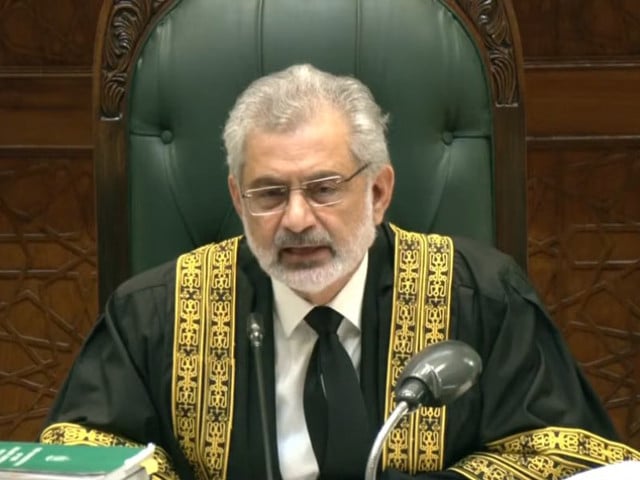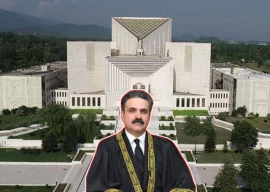
The Supreme Court, led by Chief Justice of Pakistan (CJP) Qazi Faez Isa, has made history by acknowledging the authority of parliament to legislate on matters pertaining to the apex court's operations.
This development holds particular significance as many analysts believe that since the restoration of the judiciary in March 2009, the apex court has been used to weaken civilian institutions, including parliament.
During the tenure of former CJP Iftikhar Chaudhry, the Supreme Court had compelled parliament to introduce the 19th Constitution Amendment to implement the court's recommendations regarding the appointment of judges to the superior judiciary.
During the tenures of former CJPs Iftikhar Muhammad Chaudhry, Mian Saqib Nisar, and Umar Ata Bandial, the Supreme Court struck down numerous laws. The apex court's public interest jurisdiction was often employed for political engineering, leading to the disqualification of several lawmakers under Article 184(3).
However, during the recent case hearings, CJP Isa admitted that the judiciary had been misused, and judgments had been delivered without adhering to due process.
In the past, Supreme Court judges had stressed the supremacy of the Constitution over parliament. These judges had, over the last two decades, interpreted constitutional provisions in a way that established the judiciary's supremacy over parliament. Nevertheless, the apex court had also shown judicial restraint when dealing with the powers that be.
A senior lawyer described the full court's ruling as a significant victory, not only for parliament but also for CJP Isa. He considered it the defeat of judicial arrogance that had prevailed in the form of judicial opinions for a long time.
The majority order, endorsed by ten judges, upheld the Supreme Court (Practice and Procedure) Act, 2023, which regulates the CJP's discretionary powers to constitute benches and list cases.
The misuse of public interest jurisdiction by former CJPs in the last two decades had drawn strong criticism. It often lacked transparency in bench composition and case listing.
Now, a committee comprising three senior judges, including the CJP, will be responsible for forming benches and listing cases. This move aims to bring transparency to the internal workings of the apex court. It is expected that the Supreme Court Rules will also be reviewed by a full court.
Notably, former CJP Umar Ata Bandial did not decide on petitions against the SC (Practice and Procedure) Act, 2023. Since April 13, he had governed the SC's operations through a stay order.
Interestingly, two judges, Justice Muhammad Ali Mazhar and Justice Hasan Rizvi, who had initially endorsed the April 13 order suspending the act, have now upheld this law, marking a significant success for CJP Isa.
However, both judges have ruled against the provision of the law authorizing the retrospective application of the right of appeal against decisions. This means that no appeal can be filed against decisions issued before the enactment of this law.
Some senior lawyers believe that this offers significant relief for former CJPs and their like-minded judges who were concerned about the potential reversal of their jurisprudence in public interest cases if the right of appeal were allowed retrospectively.
Justice Mazhar and Justice Rizvi were appointed as SC judges disregarding the seniority principle during the terms of Justice Gulzar Ahmed and Justice Umar Ata Bandial. As a result, the judgments made during the CJPs' terms in public interest cases cannot be overturned.
There is a debate as to whether this order will affect former Prime Minister Nawaz Sharif, who was disqualified by the Supreme Court in July 2017 in the Panama Papers case.
Parliament has already determined that disqualification under Article 62(1)(f) of the Constitution will be for five years. Interestingly, this law has not been challenged in superior courts so far. Consequently, Nawaz Sharif and Jahangir Tareen may submit their nomination papers for the next elections.
Commenting on the verdict, Abdul Moiz Jafferii Advocate, noted that it is commendable that CJP Isa chose to take the challenging route to achieve the decision he desired.
Instead of forming a bench of his preference to overturn the stay order issued by the Supreme Court on April 13, suspending the operation of the SC (Practice and Procedure) Act, 2023, he presented the process to the entire country, allowing every judge to have a say and vote.
However, Jafferii disagreed with the findings of the majority judges, believing that this act was beyond parliament's legislative competence.
He suggested that this act became possible due to the former chief justices' failure to frame proper rules for the Supreme Court. In his view, when CJPs engage in politics, they play into the hands of those whose role is to do politics.









1730379446-0/WhatsApp-Image-2024-10-31-at-17-56-13-(1)1730379446-0-270x192.webp)
1724926799-0/Untitled-design-(7)1724926799-0-270x192.webp)







COMMENTS
Comments are moderated and generally will be posted if they are on-topic and not abusive.
For more information, please see our Comments FAQ